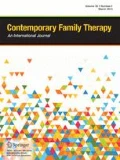Abstract
This study examined the association between religiosity and marital satisfaction among first-married and remarried adults. Seven hundred and eighty-seven heterosexually married adults from the Flanders region in Belgium completed the Maudsley Marital Questionnaire (MMQ) and a four-item religiosity scale, measuring marital satisfaction and religiosity respectively. This study found the effect of gender and marital status statistically significant (p < .0001) on religiosity. For marital satisfaction, the effect of gender and marital status statistically significant only for MMQ-S (p < .0001) and MMQ-M (p < .0001) respectively. Religiosity had a significant positive correlation (r = .19, p < .0001) with sexual-adjustment problems (MMQ-S). The ultimate aim of this study was to inform marital and relational therapists the value of a possible association religiosity has on marital satisfaction.
Similar content being viewed by others
References
Anderson, S. A., Russell, C. S., & Schumm, W. R. (1983). Perceived marital quality and family life-cycle categories: A further analysis. Journal of Marriage and Family, 45, 127–139.
Albrecht, S. L., & Kunz, P. R. (1980). The decision to divorce: A social exchange perspective. Journal of Divorce, 3, 319–337.
Arrindell, W. A., Emmelkamp, P. M., & Bast, S. (1983). The Maudsley Marital Questionnaire (MMQ): A further step towards its validation. Personality and Individual Differences, 4(5), 457–464.
Bahr, H. M., & Chadwick, B. A. (1985). Religion and family in Middletown USA. Journal of Marriage and Family, 47, 407–414.
Billiet, J., Dobbelaere, K., Riis, O., Vilaga, H., Voye L., & Welkenhuysen-Gybels, J. (2003). Church commitment and some consequences in western and central Europe. In R. L. Piedmont, & D. O. Moberg (Eds), Research in the Social Scientific Study of Religion (pp. 129–159). Vol 14. Koninjlijke, Brill Leiden NL
Booth, A., Johnson, D. R., Branaman, A., & Sica, A. (1995). Belief and behaviour: Does religion matter in today’s marriage? Journal of Marriage and Family, 57, 661–671.
Call, V. R., & Heaton, T. B. (1997). Religious influence on marital stability. Journal of Scientific Study of Religion, 36, 382–392.
Glenn, N. D. (1982). Inter-religious marriage in the United States: Patterns and recent trends. Journal of Marriage and Family, 44, 555–556.
Glenn, N. D., & Supancic, M. (1984). The social and demographic correlates of divorce and separation in the US: An update and reconsideration. Journal of Marriage and Family, 46, 563–585.
Hatch, R. C., James, D. E., & Schumm, W. R. (1986). Spiritual intimacy and marital satisfaction. Family Relations, 35, 539–545.
Hünder, O. S., & Gencöz, T. (2005). The effect of religiousness on marital satisfaction: Testing the mediator role of marital problem solving between religiousness and marital satisfaction. Contemporary Family Therapy, 27(1), 123–136.
Hutsebaut, D. (1996). Post critical belief: A new approach of the religious attitude problem. Journal of Empirical Theology, 9(2), 48–66.
Hutsebaut, D. (1997). Identity statuses, ego-integration, God representation and religious cognitive styles. Journal of Empirical Theology, 10, 39–54.
Janssen, J., Poortman, A., De Graaf, P. M., & Kalmijn, M. (1998). The instability of marital and cohabiting relationships in the Netherlands. Mens en Maatsschappij, 73, 4–26.
Jenkins, K. W. (1991). Religion and families. In S. J. Bahr (Ed.), Family research: A sixty-year review, 1930-1990 (pp. 235–288). Lexington, MA: Lexington Books.
Johnson, E., & Sandage, S. J. (1999). A postmodern reconstruction of psychotherapy: Orienteering, religion and the healing of the soul. Psychotherapy, 36, 1–15.
Kalmijn, M. (1999). Father involvement in childrearing and the perceived stability of marriage. Journal of Marriage and Family, 61, 409–421.
Kunz, P. R., & Albrecht, S. L. (1977). Religion, marital happiness, and divorce. International Journal of Sociology of the Family, 7, 227–232.
Larson, L. E., & Goltz, J. W. (1989). Religious participation and marital commitment. Review of Religious Research, 30, 387–400.
Mahoney, A., Pargament, K. I., Tarakeshwar, N., & Swank, A. (2001). Religion in the home in the making 1980s and 90s: A meta-analytic review and conceptual analysis of religion, marriage, and parenting. Journal of Family Psychology, 15, 559–596.
Nye, F. I., White, L., & Frideres, J. S. (1973). A preliminary theory of marital stability: Two models. International Journal of Sociology of the Family, 3, 102–122.
Patterson, J., Hayworth, M., Turner, C., & Raskin, M. (2000). Spiritual issues in family therapy: A graduate-level course. Journal of Marital and Family Therapy, 26, 199–210.
Rohrbaugh, J., & Jessor, R. (1975). Religiosity in youth: A personal control against deviant behaviour. Journal of Personality, 43, 136–155.
Rose, E. M., Westefeld, J. S., & Ansley, T. N. (2001). Spiritual issues in counseling: Client’s beliefs and preferences. Journal of Counseling Psychology, 48, 67–71.
Schumm W. R., Bugaighis M. A. (1986). Marital quality over the marital career: Alternative explanations. Journal of Marriage and Family, 48, 165–178.
Sherkat, D. E., & Ellison, C. G. (1999). Recent development and current controversies in the sociology of religion. Annual Review of Sociology, 25, 363–394.
Sullivan, K. T. (2001). Understanding the relationship between religiosity and marriage: An investigation of the immediate and longitudinal effects of religiosity on newlywed couples. Journal of Family Psychology, 15, 610–628.
White, L. K., & Booth, A. (1991). Divorce over the life course: The role of marital happiness. Journal of Family Issues, 12, 5–21.
White, L., & Edwards, J. N. (1990). Emptying the nest and parental well-being: An analysis of national panel data. American Sociological Review, 55(2), 235–242.
Wilson, J., & Musick, M. (1996). Religion and marital independence. Journal for the Scientific Study of Religion, 35, 30–40.
Author information
Authors and Affiliations
Corresponding author
Additional information
This study was conducted at the Institute for the Family and Sexuality Sciences, Katholieke Universiteit Leuven, as part of doctoral research.
Rights and permissions
About this article
Cite this article
Orathinkal, J., Vansteenwegen, A. Religiosity and Marital Satisfaction. Contemp Fam Ther 28, 497–504 (2006). https://doi.org/10.1007/s10591-006-9020-0
Published:
Issue Date:
DOI: https://doi.org/10.1007/s10591-006-9020-0




